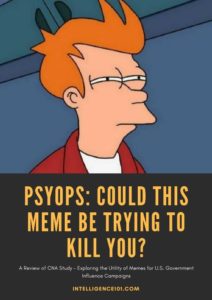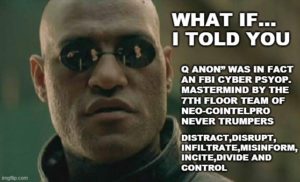Did your friend tell you the media are running a ‘psyop’ on the public? This post unpacks the meaning and origin of this expression.
Meaning
The term ‘psyop’ refers to covert operations hidden out of public view. In many cases, it relates to media ‘psyops’ that spread disinformation about a specific subject in order to spread confusion that acts as a cover for achieving another goal.
Psychological operations (PSYOP) convey selected indicators and information to audiences, influencing their motives, emotions, and objective reasoning. Psyops have the goal of changing the behavior of society and government.
The purpose of US psyops is to reinforce or induce behavior favorable to US strategic objectives. Psyops form an integral part of the range of informational, diplomatic, economic, and military activities available to the United States.
Psyops are utilized during both conflict periods and in peacetime. Three types of psyops are employed by the sub-section responsible for carrying out these operations.
The US government conducts ‘Strategic, Operational, and Tactical’ PSYOPs. Tactical commanders across military operations receive instructions to carry out psyops to support tactical missions against forces that oppose the United States. Psyops are a subject of controversy and many conspiracy theories.
Example Usage
"I think the whole virus thing is just a government psyop. There's so much disinformation on both sides of the fence that no one knows what's happening. It's genius if you think about it."
"Governments are notorious for launching psyops against the American people. That's what MK Ultra was all about, after all."
"Governments love using psyops to distract people's attention from what's going on. Go and research 'false flag events,' and you'll understand what I'm talking about."
"Media psyops are mindblowing. The media controls us more than we think. They can easily spread disinformation on anything they want and gaslight the public into submission."
"Psyops occur across all military powers. Governments will use these resources to execute plans that achieve their goals, even if it means doing it covertly and denying involvement."
"Some people think that psyops are nothing but a conspiracy theory. However, you can look it up on Wiki for yourself. They admit to actively engaging in them during peacetimes and war."
"Did you know there are three types of psyops? You have strategic, operational, and tactical psyops, and all governments use them to achieve their objectives."


Origin
The expression 'psyop' originates from WWI. The American Expeditionary Force (AEF) Military Intelligence Branch within the Executive Division of the General Staff established the Propaganda Sub-Section in 1918.
The history of the name of the sub-section is confusing and interesting. Between 2010 and 2014, the PSYOP division was renamed to the 'Military Information Support Operations' (MISO), then renamed back to PSYOP in August 2014, and switched back to MISO again in 2015. The division was renamed PSOP again in October 2017.
Phrases Similar to Psyop
- Gaslighting.
- False Flag.
- Disinfo campaign.
Phrases Opposite to Psyop
- Out in the open.
- Uncorrupted information.
What is the Correct Saying?
- Psyop.
- Psyops.
Ways People May Say Psyop Incorrectly
Some people may confuse the term ‘psyops’ with others like ‘gaslighting’ or ‘disinformation campaigns.’ It’s also common to confuse it with a ‘false flag event.’ Using it to describe a cyclops is incorrect.
Acceptable Ways to Phrase Psyop
You can use the term ‘psyop’ in social conversations, particularly those surrounding conspiracy theories. If you notice strange events where the government seems to have a shady involvement in it, you could speculate they’re involved in a ‘psyop.’ You can use the term to explain situations where you think the government is engaged in nefarious activity out of the public view.”
You can use ‘psyop’ to describe situations where you think people close to you or your friends are orchestrating efforts against you. It’s a similar term to gaslighting, but on a grander scale. For instance, a friend could be running psyop against you to tarnish your reputation with your partner.